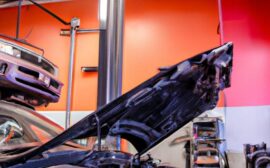Introduction
An automotive technician, often referred to as a mechanic, is a skilled professional responsible for diagnosing, repairing, and maintaining vehicles. These individuals play a crucial role in keeping cars, trucks, and other vehicles running smoothly on the road. Without automotive technicians, our daily commutes and road trips would be filled with uncertainty and potential breakdowns.
Definition of an Automotive Technician
Automotive technicians are trained experts who possess a deep understanding of automobile systems and components. They have the knowledge and skills to identify mechanical issues, perform necessary repairs, and ensure that vehicles are safe and operational. From conducting routine maintenance tasks to troubleshooting complex engine problems, automotive technicians are the unsung heroes behind the scenes, keeping our vehicles in top condition.
Importance of Automotive Technicians in the Automotive Industry
In the fast-paced world of automobiles, automotive technicians are essential for maintaining the safety and efficiency of vehicles. Their expertise and attention to detail help prevent accidents and breakdowns on the road, ultimately saving lives and ensuring the smooth functioning of our transportation system. As technology continues to advance in the automotive industry, the role of automotive technicians becomes even more critical in adapting to new innovations and keeping up with evolving vehicle technologies.
Educational Requirements for Becoming an Automotive Technician
High School Diploma or GED
To embark on a career as an automotive technician, the first step is typically obtaining a high school diploma or General Educational Development (GED) certificate. This foundational education provides essential knowledge in subjects such as mathematics, science, and English, which are valuable for understanding the technical aspects of automotive repair.
Technical Training Programs
After completing high school, aspiring automotive technicians often enroll in technical training programs. These programs, offered by vocational schools, community colleges, and technical institutes, provide hands-on training in automotive technology, engine diagnostics, and repair techniques. Through classroom instruction and practical experience, students gain the skills necessary to excel in the field of automotive repair.
Certification and Licensing Requirements
In addition to formal education and training, automotive technicians may be required to obtain certification and licensing. Certification programs, such as those offered by the National Institute for Automotive Service Excellence (ASE), demonstrate a technician’s competence and expertise in specific areas of automotive repair. Licensing requirements vary by state but typically involve passing exams to demonstrate proficiency in automotive maintenance and repair practices. Meeting these certification and licensing requirements not only enhances a technician’s credibility but also opens up opportunities for career advancement in the automotive industry.
Duties and Responsibilities of an Automotive Technician
Diagnosing and Repairing Vehicle Issues
One of the primary responsibilities of an automotive technician is to diagnose and repair vehicle issues. This involves identifying the root cause of mechanical problems, such as engine malfunctions, brake issues, or electrical system failures. By utilizing their knowledge and expertise, automotive technicians troubleshoot and fix these issues to ensure the optimal performance of the vehicle.
Performing Routine Maintenance Tasks
In addition to addressing specific vehicle problems, automotive technicians are also tasked with performing routine maintenance tasks. This includes tasks such as oil changes, tire rotations, and fluid checks. By adhering to manufacturer recommendations and maintenance schedules, automotive technicians help extend the lifespan of vehicles and prevent potential breakdowns.
Conducting Inspections and Testing Components
Automotive technicians are responsible for conducting thorough inspections of vehicles to identify potential issues or areas of concern. They inspect various components, such as brakes, suspension systems, and exhaust systems, to ensure that everything is in proper working order. Additionally, automotive technicians conduct tests using diagnostic tools and equipment to pinpoint problems that may not be immediately visible.
Using Diagnostic Tools and Equipment
Modern vehicles are equipped with advanced technologies, making diagnostic tools and equipment essential for automotive technicians. These tools help technicians identify electronic or mechanical issues by scanning for error codes and conducting diagnostic tests. By utilizing these tools effectively, automotive technicians can accurately diagnose problems and provide efficient solutions for vehicle repairs.
Skills and Qualities Needed to Become a Successful Automotive Technician
Mechanical Aptitude
Having a natural inclination towards understanding how things work and a knack for working with tools and machinery is a fundamental requirement for automotive technicians. With a keen mechanical aptitude, technicians can efficiently diagnose and repair vehicle issues, ensuring that each task is completed with precision and accuracy.
Problem-Solving Skills
The ability to troubleshoot and solve complex problems is crucial for automotive technicians. Whether it’s identifying the root cause of a malfunction or devising a solution to a tricky technical issue, strong problem-solving skills enable technicians to tackle challenges effectively and efficiently.
Attention to Detail
In the world of automotive repair, even the smallest oversight can lead to significant consequences. Automotive technicians must possess a keen eye for detail, carefully inspecting vehicles, diagnosing problems accurately, and ensuring that every repair is completed with meticulous attention to detail to guarantee the safety and reliability of the vehicle.
Strong Communication Skills
Effective communication is key for automotive technicians to interact with customers, colleagues, and supervisors. Clear and concise communication ensures that information is relayed accurately, expectations are managed, and customers are informed about the status of their vehicle repairs. Additionally, good communication skills foster a positive work environment and promote teamwork among technicians.
Ability to Work in a Team
Collaboration is essential in the automotive industry, and automotive technicians must be able to work effectively with others. Whether it’s coordinating with fellow technicians, communicating with service advisors, or collaborating with parts specialists, the ability to work in a team ensures that tasks are completed efficiently and that the overall workflow in the auto repair shop runs smoothly.
Career Opportunities and Advancement for Automotive Technicians
Specialization Options
Automotive technicians have the opportunity to specialize in various areas within the field. Some may choose to focus on specific types of vehicles, such as diesel mechanics working on trucks or performance technicians enhancing sports cars. By honing their skills in a particular niche, automotive technicians can become experts in their chosen specialty and offer specialized services to customers.
Advancement to Lead Technician or Service Manager Roles
For automotive technicians looking to advance their careers, there are opportunities to move into leadership positions within service departments. Lead technicians oversee the work of other technicians, ensuring that repairs are completed efficiently and accurately. Service managers are responsible for managing the overall operations of the service department, including scheduling, customer relations, and inventory management. Advancement to these roles requires not only technical expertise but also strong leadership and communication skills.
Opportunities for Continuing Education and Training
In the ever-evolving automotive industry, continuous learning is essential for automotive technicians to stay up-to-date with the latest technologies and advancements. Many employers offer opportunities for continuing education and training, whether through manufacturer-sponsored programs, online courses, or workshops. By investing in ongoing education, automotive technicians can expand their knowledge base, improve their skills, and stay competitive in the industry.

